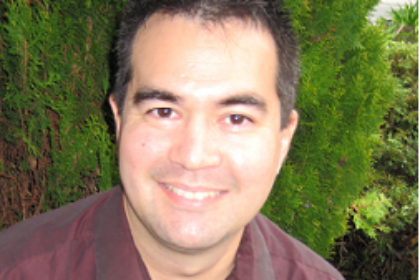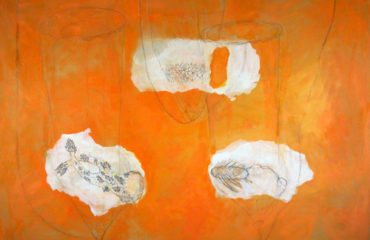
CROSSING
No turning back. Deep in the Utah desert now, having left one home
to return to the temple of my grandfather. I press the pedal
hard. Long behind me, civilization’s last sign—a bent post
and a wooden board: No food or gas for 200 miles. The tank
needling below half-full, I smoke Camels to soothe
my worry. Is this where it happened? What’s left out there of Topaz
in the simmering heat? On quartzed asphalt I rush
past salt beds, squint at the horizon for the desert’s edge: a lone
tower, a flattened barrack, some sign of Topaz—the camp
where my mother, her family, were imprisoned. As I speed
by shrub cactus, the thought of it feels too near,
too close. The engine steams. The radiator
hisses. Gusts gather, wind pushes my Civic side
to side, and I grip the steering wheel, strain to see
through a windshield smeared with yellow jacket wings, blood
of mosquitoes. If I can find it, how much can
I really know? Were sandstorms soft as dreams or stinging
like nettles? Who held my mother when the wind whipped
beige handfuls at her baby cheeks? Was the sand tinged
with beige or orange from oxidized mesas? I don’t remember
my mother’s answer to everything. High on coffee
and nicotine, I half-dream in waves of heat: summon ghosts
from the canyon beyond thin lines of barbed wire. Our name
Ishida. Ishi means stone, da the field. We were gemstones
strewn in the wasteland. Only three days
and one thousand miles to go before I reach
San Francisco, the church where my mother was born
and torn away. Maybe Topaz in the desert was long
gone, but it lingered in letters, photos, fragments
of stories. My mother’s room now mine, the bed pulled blank
with ironed sheets, a desk set with pen and paper. Here
I would come to understand.
TEMPLE BELL LESSON
Son, I am weighted.
You are light.
Our ancestors imprisoned,
outcast
in sand, swinging
between scorching air
and the insult
of blizzards.
Their skin bronzed
and chilled
like brass,
listen
to their sorrow
ringing.
GATEKEEPER
Any noise alerts me. My wife Grace shifts beneath our comforter.
Respecting my uncles long dead, I climb from bed, grab
the bat, climb stairs, walk halls with a thousand sutras shelved
high, my grandparents’ moonlit ink floating on pages sheer
as veils, the word Love rescued from censors. In the nursery
I check window-locks, sense my son Brendan falling in and out
of seizures and sleep. Backed by the altar, its purple chrysanthemum
curtains, gold-leafed lily pads, corroded rice paper, I crouch
then stand at the window to watch silhouettes fleeing
past streetlamps, the gate unmoored from its deadbolt, unhinged
from ill-fitted screws and rusted nails. The front door cottoned
with fog shakes in night wind. Backyard bushes rustle. For now
I let the mendicants crack open our prickly crowns of aloe, soothe
their faces with gel, drop bottle-shards and cigarette butts that slash
and burn our stairs. Inside, we fit apart and together.
Grace and Brendan sleeping, me standing guard.
From my grandfather’s scrolls moths fly out, and I grab at air
to repel the strangeness of other lives circling toward us.
From Topaz (c) 2013 by Brian Komei Dempster.
Reprinted with permission of Four Way Books. All rights reserved.
An earlier version of “Gatekeeper” was first published in Parthenon West Review.
|
Topaz, Brian Komei Dempster’s debut poetry collection, examines the experiences of a Japanese American family separated and incarcerated in American World War II prison camps. This volume delves into the lasting intergenerational impact of imprisonment and breaks a cultural legacy of silence. Through the fractured lenses of past and present, personal and collective, the speaker seeks to piece together the facets of his own identity and to shed light on a buried history. |


